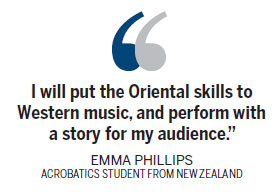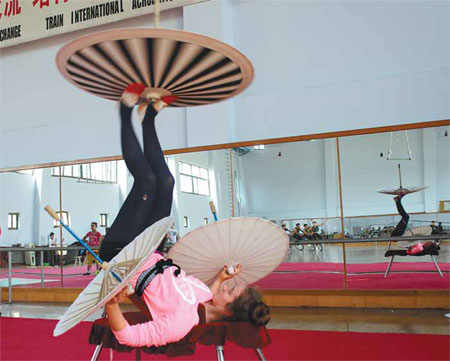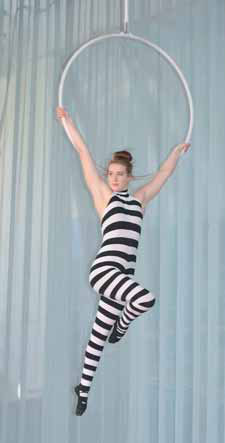Emma's juggling act
Updated: 2013-05-28 06:54
By Zheng Jinran (China Daily)
|
||||||||
|
Emma Phillips has overcome major hurdles to realize her dream. She shows off her new skills juggling parasols at the Wuqiao Acrobatic School. Zheng Jinran / China Daily |
|
Phillips practices on a swinging ring at the school. Provided to China Daily |

She has traveled halfway across the world to learn from the best teachers and she's working hard at balancing training to be an excellent acrobat, and her homesickness. Zheng Jinran finds out more in Wuqiao, Hebei province.
There is a lot of energy in the large training hall, with the swift figures of teenage students flitting everywhere. Their yells as they train fill the room. Amid the noise, a young brunette is lying on her back on a bench, totally focused on juggling a parasol with her feet.
This is the circus school in Wuqiao, a rural city in Hebei province.
Emma Phillips, 23, is from a city on the north island of New Zealand, and she was the only foreigner in the school until the recent arrival of a Finnish couple. She was also the only adult in a school where most of the students start training at the age of 6.
The oldest was only 17.
"People from the school and residents in town are curious about me, wondering why a foreigner will come all the way to a rural county and learn acrobatics. But I know what I want and I'll keep at it," she says.
"I will put the Oriental skills to Western music, and perform with a story for my audience."
She came to China in 2012, and has already been training hard for five months at the Wuqiao Acrobatic Art School in the small town famous for its circus arts in Hebei.
Her flight to China took a long time, but she is used to long journeys - like the hard road she traveled to realize her childhood dream of becoming an acrobat.
Phillips was 13 when she saw a performance by a circus troupe visiting her hometown.
"When I saw the amazing contortions by the performers, I thought it was fascinating," she recalls, her eyes shining from the memory even though it's been a decade since then.
She made the change from dancing - jazz, cabaret and ballet - and was determined to become an acrobat.
In Whangarei, where Phillips comes from, children took up acrobatics more as an extra-curricular activity, rather than a full-time pursuit. Phillips was not daunted, and turned to videos on the Internet to help her train.
After she graduated from high school at 17, she enrolled in a local circus school for two years. Even so, it did not offer what she wanted.
The school gave the students lessons on dance, theater and performance, but Phillips had expected more. She decided to further her skills after graduation.
She heard about the circus schools in China and decided to see for herself in 2010, traveling around for months. She returned to Beijing in May 2012, and then started preparing to train, finally, in the country where acrobatics had its origins.
She first attended a circus school in Beijing, where she made many friends from abroad, all sharing the same vision. But she wanted more, and so she enrolled in the school in Wuqiao.
"The training is really hard. I am exhausted but happy," she says in her dormitory during a short break.
The instructor coaches her five hours a day, six days a week. Sometimes she will continue her training for another three hours at night. This tight schedule will last until the end of December.
Phillips has already worn out six Chinese parasols, and now she is moving on to something even harder - juggling a 1-square-meter table, an act that is seldom performed outside China.
Often bruised or in pain from the long, intensive training, Phillips says what hurts her more is missing her friends and her family, whom she has not seen for a year.
"I call them or chat online after training," she says, looking at photographs of her family, and the town where she came from. There are other hurdles apart from her homesickness. Phillips cannot speak more than a few words of Chinese, and her coach, Liu Lin, does not speak English.
"It was hard to communicate during the initial months," Liu says. "Then I downloaded a translation application on my cell phone, so now we can talk, helped by body language."
Phillips has also made serious attempts to learn Mandarin and she can now master some sentences.
"I still want to have a Chinese teacher, so I can understand more about the traditions and culture of acrobatics," she says.
Age was also another barrier, Liu Lin says.
"Compared to the younger students, Emma can absorb and understand the guidelines better, but physically, she does not have the advantage," Liu says.
Yet despite all the challenges, Phillips is very committed to her dream of one day performing with a troupe in China, touring the world and combining circus, theater and dance.
"Foreign students like Emma appreciate our lessons very much. It has been an important channel of education exchange between China and other countries, and an excellent channel through which to spread our traditions," says Li Qingming, who is in charge of foreign student management at the school in Wuqiao.
He says more than 20 student from African countries will arrive in May to study for a year.
Phillips is happy to hear the news. "I will have more foreign friends soon, and it will be nice to be able to talk to them, and train with them."
Contact the writer at zhengjinran@chinadaily.com.cn.
(China Daily USA 05/28/2013 page09)

 Michelle lays roses at site along Berlin Wall
Michelle lays roses at site along Berlin Wall
 Historic space lecture in Tiangong-1 commences
Historic space lecture in Tiangong-1 commences
 'Sopranos' Star James Gandolfini dead at 51
'Sopranos' Star James Gandolfini dead at 51
 UN: Number of refugees hits 18-year high
UN: Number of refugees hits 18-year high
 Slide: Jet exercises from aircraft carrier
Slide: Jet exercises from aircraft carrier
 Talks establish fishery hotline
Talks establish fishery hotline
 Foreign buyers eye Chinese drones
Foreign buyers eye Chinese drones
 UN chief hails China's peacekeepers
UN chief hails China's peacekeepers
Most Viewed
Editor's Picks

|

|

|

|

|

|
Today's Top News
Shenzhou X astronaut gives lecture today
US told to reassess duties on Chinese paper
Chinese seek greater share of satellite market
Russia rejects Obama's nuke cut proposal
US immigration bill sees Senate breakthrough
Brazilian cities revoke fare hikes
Moody's warns on China's local govt debt
Air quality in major cities drops in May
US Weekly

|

|









